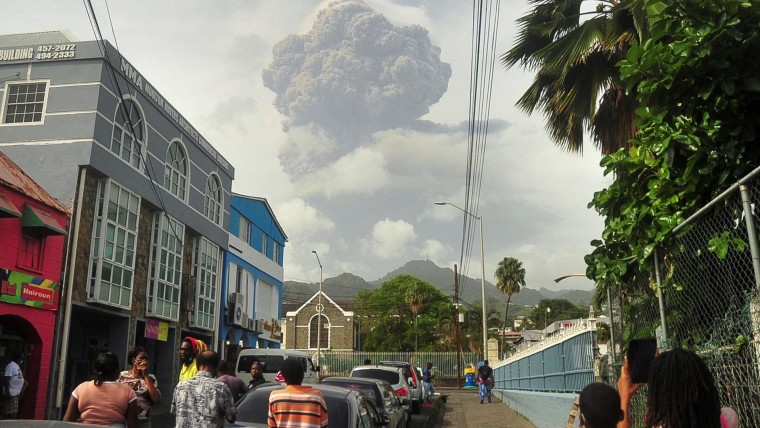KINGSTOWN, St. Vincent — People who ignored an initial warning to evacuate the area closest to a volcano on the eastern Caribbean island of St. Vincent raced to get clear Saturday, a day after it erupted with an explosion that shook the ground, spewed ash skyward and blanketed the island in a layer of fine volcanic rock.
The eruption Friday of La Soufriere — its first large one since 1979 — transformed the island's lush towns and villages into gloomy, gray versions of themselves. A strong sulfur smell was unavoidable Saturday and ash covered everything, creeping into homes, cars and noses, and obscuring the sunshine that makes the island so popular with tourists.
Chellise Rogers, who lives in the village of Biabou, which is in an area of St. Vincent that's considered safe, said she could hear continuous rumbling.
"It's exhilarating and scary at the same time," she said. "(It's the) first time I am witnessing a volcano eruption."
Scientists warn that the explosions could continue for days or even weeks, and that the worst could be yet to come.
"The first bang is not necessarily the biggest bang this volcano will give," Richard Robertson, a geologist with the University of the West Indies' Seismic Research Center, said during a news conference.
About 16,000 people have had to flee their ash-covered communities with as many belongings as they could stuff into suitcases and backpacks. However, there have been no reports of anyone being killed or injured by the initial blast or those that followed. Before it blew, the government ordered people to evacuate the most high-risk area around the 4,003-foot volcano after scientists warned that magma was moving close to the surface.
Ralph Gonsalves, the prime minister of the 32 islands that make up the country of St. Vincent and the Grenadines, said on local station NBC Radio that people should remain calm, be patient and keep trying to protect themselves from the coronavirus.
He said officials were trying to figure out the best way to collect and dispose of the ash, which covered an airport runway near the capital of Kingstown, about 20 miles south, and fell as far away as Barbados, about 120 miles to the east.
"It's difficult to breathe," the prime minister said, adding that although the volcano was venting less, a big plume of ash remained. "What goes up, must come down."
Download the NBC News app for breaking news and politics
Although Gonsalves said it could take up to four months for life to return to normal, he's confident it will.
"Agriculture will be badly affected, and we may have some loss of animals, and we will have to do repairs to houses. But if we have life and we have strength — we will build it back better, stronger, together," he said.
People who didn't heed the initial evacuation order hurried to do so Saturday. At least a few ash-covered evacuees escaped in small boats and headed to other parts of the main island, which makes up 90 percent of the country's total land.
About 3,200 people took refuge at 78 government-run shelters, and four empty cruise ships stood ready to take other evacuees to nearby islands, with a group of more than 130 already taken to St. Lucia. Those staying at the shelters were tested for Covid-19, with anyone testing positive being taken to an isolation center.
Nearby nations, including Antigua and Grenada, also offered to take in evacuees.
The ash has also forced the cancellation of several flights, and poor visibility limited evacuations in some areas. Officials warned that St. Lucia to the north and Grenada to the south could get light ash fall, though most of it was expected to head northeast into the Atlantic Ocean.
Article From & Read More ( Ash-covered St. Vincent braces for more volcanic eruptions - NBC News )https://ift.tt/3a462uj
World
Bagikan Berita Ini















0 Response to "Ash-covered St. Vincent braces for more volcanic eruptions - NBC News"
Post a Comment